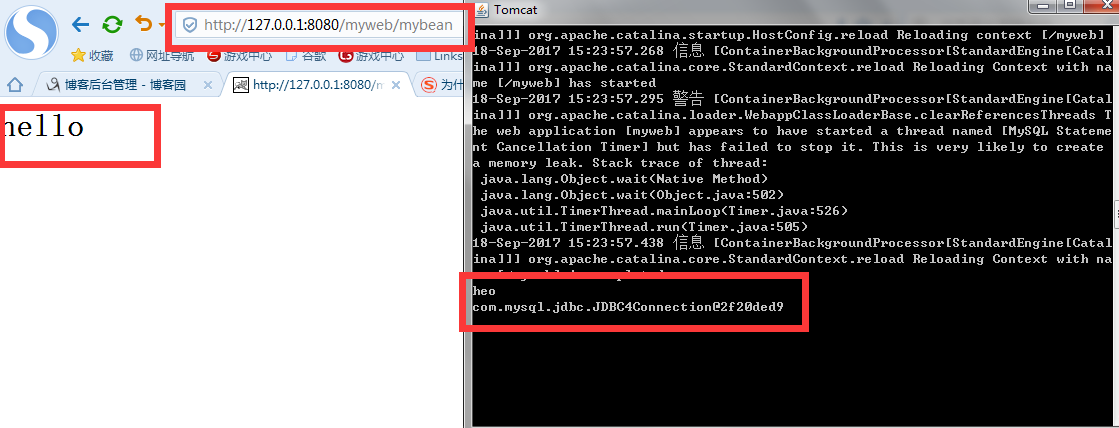Javabean的理解(通过javabean的部分程序)
1.javabean是一种规范
2.在servlet中我们都会接触数据库,需要将连接数据库的那段代码复制粘贴修改,放入我们写的servlet程序中。如果我们有100个servlet,需要复制粘贴修改100次,那样就显得没有意义了,所以这时候的javabean的含义是一个数据库连接类,让我们调用。
3.如未有javabean的代码
1 import java.sql.Connection; 2 import java.sql.DriverManager; 3 import java.sql.SQLException; 4 import java.util.Properties; 5 import javax.servlet.http.HttpServlet; 6 import javax.servlet.http.HttpServlet;import java.io.IOException; 7 import java.io.*; 8 import javax.servlet.http.HttpServletRequest; 9 import javax.servlet.http.HttpServletResponse; 10 public class ServletMysql extends HttpServlet { 11 12 protected void doGet(HttpServletRequest req, HttpServletResponse resp) throws IOException{ 13 14 try { 15 // The newInstance() call is a work around for some 16 // broken Java implementations 17 18 Class.forName("com.mysql.jdbc.Driver").newInstance(); 19 System.out.println("heo"); 20 Connection conn = 21 DriverManager.getConnection("jdbc:mysql://localhost/test?" + 22 "user=root&password=root"); 23 24 25 26 27 28 29 System.out.println(conn); 30 PrintWriter out =resp.getWriter(); 31 out.println("<html><head><head/><body><h1>hello<h1><body/><html/>"); 32 out.flush(); 33 out.close(); 34 35 } catch (Exception ex) { 36 // handle the error 37 } 38 39 40 41 42 43 44 45 }
4.将连接数据库的代码和相关引入的包抽取出来新建立一个类
1 import java.sql.Connection; 2 import java.sql.DriverManager; 3 import java.sql.SQLException; 4 import java.util.Properties; 5 6 public class JavaBean { 7 public static Connection getcon() { 8 Connection conn =null; 9 10 try { 11 12 13 Class.forName("com.mysql.jdbc.Driver").newInstance(); 14 System.out.println("heo"); 15 conn = 16 DriverManager.getConnection("jdbc:mysql://localhost/test?" + 17 "user=root&password=root"); 18 19 20 21 22 23 } catch (Exception ex) { 24 ex.printStackTrace(); 25 26 27 28 } 29 30 return conn; 31 } 32 }
5.将servlet中的代码用到该类
1 import javax.servlet.http.HttpServlet; 2 import javax.servlet.http.HttpServlet; 3 import java.io.IOException; 4 import java.io.*; 5 import javax.servlet.http.HttpServletRequest; 6 import javax.servlet.http.HttpServletResponse; 7 8 9 import java.sql.Connection; 10 import java.sql.DriverManager; 11 import java.sql.SQLException; 12 import java.util.Properties; 13 class httpservlet extends HttpServlet { 14 15 protected void doGet(HttpServletRequest req, HttpServletResponse resp) throws IOException{ 16 17 18 Connection conn = JavaBean.getcon(); 19 System.out.println(conn); 20 21 22 23 PrintWriter out =resp.getWriter(); 24 out.println("<html><head><head/><body><h1>hello<h1><body/><html/>"); 25 out.flush(); 26 out.close(); 27 } 28 29 30 31 32 33 34 }
6.将编译好的两个class部署到tomcat项目中去,然后在浏览器端输入资源访问网址

7.可以看到效果,跟未用javabean的结果一样,但是代码量多的话,就不用复制那么多代码了。





